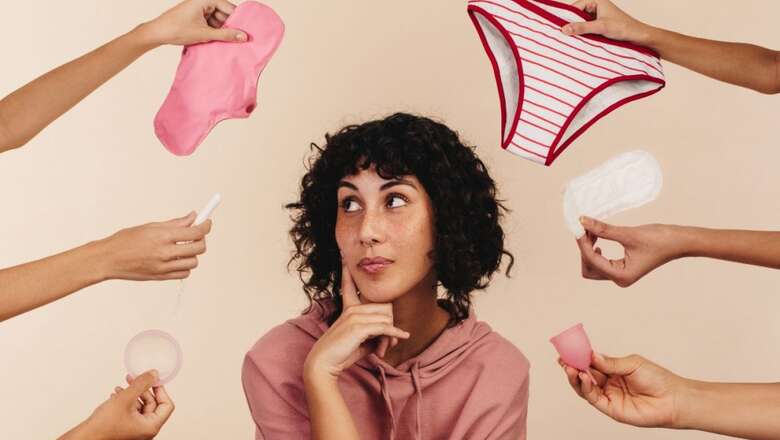
views
In the past few years, there has been a growing recognition of the importance of menstrual hygiene, shedding light on a topic that has historically been surrounded by silence and societal taboos. While the provision of sanitary pads has been a key focus, it is vital to take a broader approach and address the diverse needs of individuals who menstruate. Our efforts should encompass education, access to sustainable solutions, and the destigmatization of menstruation, going beyond simply providing pads.
“Education plays a pivotal role in transforming the landscape of menstrual hygiene. Comprehensive menstrual health education programs that reach out to girls and boys, women and men, in schools and communities are essential. Open discussions about menstrual cycles can promote awareness, understanding, and empathy without judgment or shame,” says Advaitesha Birla, Sociopreneur, Ujaas, an initiative by Aditya Birla Education Trust.
By fostering an environment that encourages dialogue and open-mindedness, we can dispel myths and misconceptions surrounding menstruation and empower individuals to make informed choices about their health and well-being. “By providing accurate information, we enable individuals to understand the biological processes involved, address any concerns or questions they may have, and promote a culture of acceptance and support,” believes Birla.
Birla feels emphasising the importance of inclusivity and respect for diverse experiences fosters an environment where menstruation is seen as a natural part of life, devoid of stigma or embarrassment. Together, through education, we can ensure that everyone has the knowledge and understanding to manage menstruation with dignity and confidence.
Looking beyond sanitary pads is crucial for several reasons. “Disposable pads contribute to significant environmental waste, while reusable alternatives like menstrual cups, cloth pads, and period panties offer sustainability and reduce the burden on landfills. Additionally, exploring these alternatives provides cost-effectiveness in the long run, as they can be used for extended periods, saving money for individuals, especially in low-income communities,” adds Birla.
Moreover, alternative products offer convenience, comfort, and customisation, catering to individual preferences and needs. They also prioritise health and safety by providing hypoallergenic options and reducing the risk of irritation. “By embracing a more comprehensive range of menstrual hygiene products, we can promote environmental sustainability, cost savings, convenience, and individual empowerment in managing menstruation. It is essential to raise awareness about these alternatives and ensure their accessibility to enable more individuals to make informed choices that suit their unique circumstances, contributing to a more sustainable and inclusive approach to menstrual hygiene,” opines Birla.
Regrettably, numerous girls and women, particularly those from marginalized communities or vulnerable backgrounds, encounter significant obstacles in acquiring affordable sanitary pads and other essential menstrual products. The financial burden adds an extra barrier, forcing them to make difficult choices between purchasing basic necessities and managing their menstrual health. This glaring inequality emphasizes the pressing need to tackle the systemic issues that perpetuate this divide. Consequently, they resort to makeshift alternatives that involve using unsafe materials or adopting unhygienic practices, posing substantial risks to their overall health and well-being. This harsh reality underscores the immediate requirement for initiatives that address the economic barriers to menstrual product access and provide sustainable solutions to cater to the needs of all menstruators.
“By advocating for policies that eliminate menstrual product taxation and implementing subsidised programs, we can bridge the affordability gap and ensure that no individual is forced to compromise their health due to financial constraints. By working together, we can create a society where every menstruator has dignified access to the menstrual hygiene products they need, promoting their overall well-being and fostering a more inclusive and equal world,” states Birla.
To tackle this issue, it is crucial to advocate for policies that eliminate menstrual product taxation and provide subsidies for those in need. We can reduce the financial burden and ensure their affordability by removing taxes on menstrual products. Additionally, establishing distribution networks and partnerships with local organisations can play a pivotal role in making menstrual hygiene products easily accessible, especially in remote or marginalised areas.
Birla says, “Collaboration between NGOs, government agencies, and community-based initiatives can create a robust support system for needy people. By working together, we can build a sustainable infrastructure that ensures the availability and accessibility of menstrual hygiene products to everyone, regardless of their socioeconomic background. This collaborative effort is essential in addressing the systemic barriers and inequalities surrounding menstrual hygiene and promoting a society where menstruation is not a hindrance but an empowered experience for all.”
We must challenge the social and cultural norms perpetuating the stigma surrounding menstruation to focus on menstrual hygiene needs by moving beyond sanitary pads. Menstruation is a natural bodily function and should be embraced without shame. Engaging community leaders, religious institutions, and media platforms can help reshape the narrative and encourage positive discussions around menstruation. Through awareness campaigns, art, and media, we can foster a supportive environment that celebrates menstruation as a symbol of strength and womanhood rather than a source of shame or embarrassment.
In conclusion, we must go beyond providing sanitary pads to strive for a world prioritising menstrual hygiene. Comprehensive menstrual hygiene initiatives encompass education, sustainable solutions, and destigmatisation. By broadening our focus, we can empower menstruating individuals with the knowledge, resources, and support they need to manage their periods with dignity and confidence. Let us work together to create a future where menstruation is no longer a barrier but a catalyst for gender equality and women’s empowerment.




















Comments
0 comment